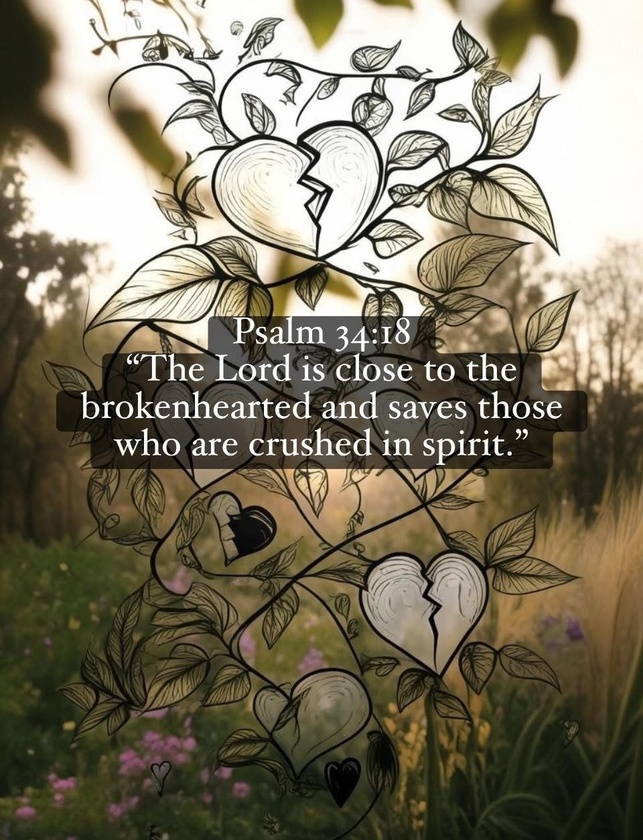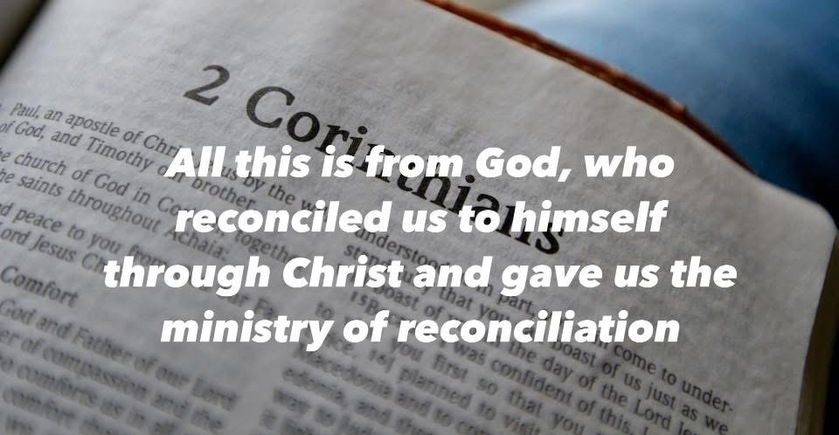Broken Hearts, Bearing Fruit: It’s the Spirit’s Work, Not Ours
Romans 6:22-23, 7:1
"But now that you have been set free from sin and have become slaves of God, the fruit you get leads to sanctification and its end, eternal life. For the wages of sin is death, but the free gift of God is eternal life in Christ Jesus our Lord. Or do you not know, brothers—for I am speaking to those who know the law—that the law is binding on a person only as long as he lives?"
What "fruit" are you bearing today?
Paul says, "for the love of Christ constrains me" (2 Corinthians 5:14). In many ways the law of love, love for Jesus Christ, is stricter than "the law".
It’s a voluntary bondage, isn’t it?
The law of love demands everything, not just outward compliance like the old Mosaic law, but a heart-level transformation. It’s stricter because it’s internal, relentless, and fueled by gratitude rather than fear. No checklists; just total surrender.
Paul's letter to the Galatians, chapter 5 beautifully expands on what that godly fruit looks like in a believer’s life. Paul contrasts the works of the flesh (verses 19-21, like immorality, idolatry, strife) with the transformative produce of the Holy Spirit.
Paul writes:
"But the fruit of the Spirit is love, joy, peace, forbearance, kindness, goodness, faithfulness, gentleness and self-control. Against such things there is no law."
Let's break these fruit down using Strong's concordance:
Love (Agape): the greatest of these fruit, its selfless, unconditional love. It expects nothing in return. Like Christ’s love for us. It’s the foundation of our faith; without it, the rest withers.
Ask: How am I loving others sacrificially today?
Joy (Chara): Down deep in your heart, an abiding gladness rooted in God, not your circumstances. Calm delight, even in terrible trials, it’s the quiet strength that sustains your soul.
Reflect: Where is my joy sourced, from fleeting highs or eternal truths?
Peace (eiréné):
Inner tranquility and harmony with God and others. It’s the calm in the midst of the storm, echoing Jesus as the Prince of Peace. Quietness, and rest.
Question: What anxieties am I surrendering to experience this?
Forbearance (Patience, Makrothymia): Long-suffering endurance, especially with people or delays. It’s grace under pressure. Waiting for a sufficient time before expressing anger. This avoids the premature use of force (retribution) that rises out of improper anger (a personal reaction).
Think: How patient am I when my plans go awry?
Kindness (Chrestotes): Benevolent goodness intentionally put in action, tender and helpful with integrity. Its compassion lived out.
Personal prompt: Who needs a kind word or deed from me right now?
Goodness (Agathosyne): Moral excellence and generosity. It’s doing right because it’s right, not to be seen doing good for the praise of others. It's reflecting God’s character.
Personal reflection: Am I pursuing goodness in hidden ways?
Faithfulness (Pistis): Reliability and loyalty, steadfast like God’s covenants. It’s trustworthiness in commitments, especially in reliance upon Christ for salvation.
Ask yourself: Where can I be more dependable in my relationship with Christ?
Gentleness (Prautes): Humble strength ("gentle-strength", "gentle-force" ), meekness without weakness, like Jesus with the vulnerable. It’s power under control.
Question: How can I respond gently in conflict?
Self-Control (Enkrateia): Mastery over impulses and desires. It’s discipline empowered by the Spirit, not willpower alone ("dominion within", "true mastery from within" ).
Personal prompt: What area of my life needs this restraint?
Conclusions in regard to the fruit of the Spirit:
These are NOT a pick-and-choose your traits scenario. It’s "fruit" (singular), it's a unified cluster of Spirit gifts. They grow together as we walk in the Spirit, free from the law’s bondage. Sanctification’s end is eternal life, but the journey bears this fruity evidence. For instance, the law says "don’t steal," but the Spirit’s fruit says "give generously from love." It goes further than the law.
So, this is a lot of great advice or information, but try living it. As for myself? I struggle with Gentleness, and Self-Control. Talking about the Fruit of the Spirit is inspiring, but living it? That’s where the real wrestle happens.
The first thing we really need to understand and get right is that these aren’t fruits we manufacture through sheer willpower, they’re produced by the Holy Spirit as we yield to Him. The key isn’t trying harder but staying connected to the Vine (Jesus Christ) through the Spirit.
What does that look like?
Start with surrender:
Pray specifically for these fruits, for instance in my case, confess lacks in gentleness (harsh words) or self-control (impulsiveness), then ask the Spirit to fill you.
Meditate on verses:
For gentleness, I should reflect on Matthew 11:29 (Jesus’ gentle heart) or Proverbs 15:1 (a gentle answer turns away wrath). The time i give to these things will form and build the Spirit fruit within me. So I need to surrender my time to do these things.
But sometimes there's a stumbling block preventing the transformation. When I slip (snapping in anger or giving into a rage habit), I shouldn't beat myself up, I should confess it to God. This clears the way for the Spirit.
In my life the greatest stumbling block was and is the way I was raised. I'm not a connected person, I was raised to be alone, to keep to myself, to trust no one with my thoughts or feelings. And so, even these many years later I don't easily or naturally seek accountability from friends or family. It's just not who I am. It's my personal brokenness. It's a harmless thing as far as society goes, I'm harmless. Except when I'm having to express gentleness or self-control in situations that are out of my control. This means when I'm haing to deal with others.
This brokenness is why I never pursued the life of a clergyman. I can honestly say I would not serve Christ well in that regard. I believe you MUST have great patience, self-control, and a gentle spirit to be an effective Pastor. I can be integral, faithful, forebearing, and loyal. I can exhort and teach a word from God, but the rotten fruit of my childhood has scarred my soul in ways that don't seem to be healed as of yet.
Certain parts of my past have wired me in ways that make gentleness and self-control feel like constant uphill battles. Where I should pause, before responding in tense situations, asking myself, "How would Jesus handle this?" I instead opt to walk away to separate myself from the situation that I know will likely become something very ugly. I don't want the conflict, I don't want to heal the wound. I want the cut to have never taken place. I want others to control themselves and examine themselves in the same way I do in my own life. But that's not realistic, people don't examine themselves. So situations crop up. And I respond with a wall. Walls built for survival that now feel like barriers to the full life God intends. And I laugh internally as I write this because I teach against building walls in the context of the Kairos Prison Ministry. I suppose I needed to do those things from my childhood in order to make life livable with the kinds of negative influences I was having to cope with at a very young age. And I still need that coping mechanism today. It's my thorn in my side.
So, I'm brokenhearted and that broken heart has only found peace and love in Christ, and in a very small select group of beautiful people in my life who also love Christ. In fact, only those people will I fully trust. I know I can trust them with my spirit because I know they love Christ. So they are my family, in Christ.
But the beauty of the gospel is that Christ meets us right in that brokenhearted space, not demanding we fix ourselves first. That "voluntary bondage" to Christ’s love isn’t about instant perfection; it’s a lifelong process where the Spirit gently (there’s that word) reshapes us. And I can see it at work in me today, walking away from potential ugliness? That’s wisdom, not weakness, it’s a form of self-control in action, even if it doesn’t feel polished yet.
Childhood brokenness isn’t really a "harmless" thing, it’s a thief that steals joy and connection. Interactions can feel like minefields. You've got to tiptoe around honesty, and for a guy like me that's not going to happen.
I take solace in knowing that God has used deeply flawed people throughout history: Paul, with his violent past; David, scarred by family dysfunction; even Moses, who fled conflict like me. But what did they all have? Faithfulness to God's will. A heart for God. Obedient and loyal to His call.
Conclusion:
The rotten parts of your fruit don’t disqualify you, they’re where His grace shines brightest.
2 Corinthians 12:9
But he said to me, "My grace is sufficient for you, for my power is made perfect in weakness." Therefore I will boast all the more gladly of my weaknesses, so that the power of Christ may rest upon me.
I will keep yielding to the Vine; trusting that the Spirit’s fruit will keep emerging, even in my scarred soil.
Prayer:
Heavenly Father, in the midst of our pain and past wounds, we yield to Your Holy Spirit. Heal our broken places, cultivate gentleness where walls stand tall, and strengthen self-control through Your love. May we bear the fruit of transformation, rooted in Jesus Christ's Holiness, all for Your glory Lord. Amen.




















